Americans have long felt that whoever sits behind the desk in the oval office is the most powerful man in the world. Whether or not this is true is debatable, but the fact remains that since George Washington was inaugurated as the first president on April 30th 1789, forty-four others have taken the very same oath and held the very same office.
So who after nearly 225 years of US presidents, can be considered in the elusive list of top ten presidents?
10. Barack Obama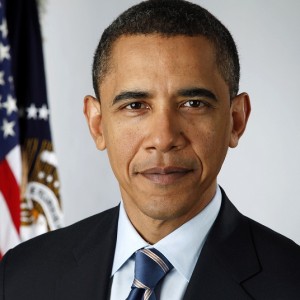
Obama’s presidency cannot be assessed in a historic perspective, but the one fact you can’t deny is that he is (and always will be) the first black American President. No other person in history will be able to hold this distinction. When you consider that African Americans had been enslaved until the conclusion of the Civil War in 1865 and that they had effectively been treated like second class citizens until the 1960’s, this really is made all the more astonishing. Obama is also a modern example of the American Dream and all that is promised in the US Constitution.
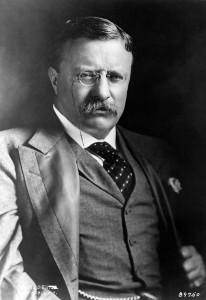 9. Theodore Roosevelt
9. Theodore Roosevelt
The former frontier rancher, Teddy Roosevelt is to this day the youngest person to hold the presidential office. He was inaugurated in 1901 after the assassination of William McKinley Jr. He is the only president of the 20th Century to be honoured at Mount Rushmore and his achievements as president are numerous. As an avid naturalist he established both national parks and national forests. He also fought for all in American society to receive a ‘Square Deal’ in which he fought for labourers to receive better wages from their employers. In terms of foreign policy he was instrumental in the building of the Panama Canal and helped end the Russo-Japanese War, for which he received a Noble-Peace Prize.
Outside his presidential life he was known for his tireless work as New York City Police Commissioner, was known to still walk the beat while holding this office and was even known to have made an arrest during this time! As a naturalist he discovered numerous species of flora and fauna in his time, and as a result is greatly honoured at the American Museum of Natural History in New York City.
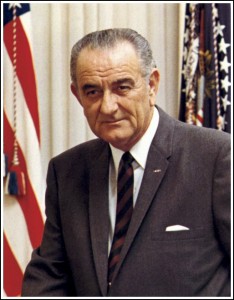 8. Lyndon B. Johnson
8. Lyndon B. Johnson
This is perhaps one of the more controversial choices on this list. LBJ has long been criticised as an aggressive, hawkish Texan who actively implemented policies to escalate America’s involvement in Vietnam. Many see him as willingly sending thousands upon thousands of young Americans to their death in the South-Asian jungle in a conflict he had no business being involved with in the first place. But what is largely overshadowed is the fact that LBJ inherited the Vietnam issue from JFK. JFK would in all likelihood have followed a similar course of escalation, but he in turn had inherited US involvement in the region from administrations that had preceded him. LBJ described Vietnam as ‘the biggest damn mess I ever saw’.
LBJ should really be praised for his dedication to social reform and support for Civil Rights, or what he described as his ‘Great Society’. It was he who pushed through the Civil Rights Act in 1964 which outlawed racial segregation, the Voting Rights Act of 1965 which allowed millions of black southerners to vote for the first time and the Civil Rights Act of 1968 which provided equal housing opportunities for all. LBJ also maintained that his real war was not in Vietnam but in America itself; the war against poverty. Johnsons Great Society programme introduced Medicare, Mediaid, education, urban renewal and helped develop depressed regions. Much of this social reform was only pushed through congress due to LBJ’s political cunning. There is a school of thought amongst historians that argues that LBJ only escalated America’s involvement in Vietnam, to gain the support of anti-Communist and conservative Republicans to further his Great Society programme.
A big shout should go out to William Henry Harrison, who in 1841 became the oldest person to take the presidential office, until Ronald Reagan over a century later. Harrison must be considered one of the most dedicated and hardworking presidents, as his inaugural address took almost 2 hours to read! Unfortunately, the bitter coldness of his inauguration day led to him contracting Pneumonia and dying just 32 days after taking office. Effectively, Harrison helped establish the tradition of the vice-president taking office upon the president’s death after being replaced by John Tyler.
 7. James Monroe
7. James Monroe
Not only is Monroe credited as the last of the Founding Fathers to hold the presidential office, but what he contributed to foreign policy and the modern day geo-political landscape of America is hugely important. Before his presidency he helped negotiate the Louisiana Purchase in 1803, which added the mid-western states to America’s land mass. However, as president he credited with purchasing Florida from Spain, as well as signing the Adams-Onis Treaty in 1819 which is often credited as America’s first effort to creating a global empire. However, Monroe’s most significant contribution to American culture, and the tradition of their foreign policy, is the Monroe Doctrine of 1823. The Monroe Doctrine asserted that any attempt by European powers to colonise the Americas would be seen as an act of aggression by the United States. In effect, Monroe ended a tradition of European colonisation in the America’s which dated back to the days of Columbus. The Monroe Doctrine has further been cited by numerous 20th Century presidents when justifying their foreign policy decisions including JFK, LBJ and Reagan.
 6. John F. Kennedy
6. John F. Kennedy
Much of JFK’s legacy revolves around his assassination in Dallas and the subsequent conspiracy theories that surround the events of that day. It hasn’t helped that Oliver Stone has popularised interest in the event and television documentaries seem to be as easily fascinated by the subject. Behind the moon landing, the assassination of JFK is probably the most popular of all the great American conspiracy theories.
However, the everyday person seems to greatly overlook what a talented, able and accomplished foreign policy diplomat JFK was. In this respect Kennedy was exceptional. Despite his failure in the Bay of Pig’s invasion, he was successfully able to negotiate the release of 1,200 of the 1,500 invading rebels sent by the US. He also helped contain Latin American communism, as put forward in the Kennedy Doctrine. Additionally, given the escalation policies in Vietnam of both LBJ’s and Nixon’s administration, JFK had an overall successful Vietnam policy. However, it was the events of October 1962 where JFK really managed to flex his foreign policy muscles. The Cuban Missile Crisis saw Khrushchev of the USSR place missiles on Cuba, seemingly a stones throw from the United States. Many maintain that the USA and USSR were just minutes away from nuclear war, making the ideological conflict that was the Cold War very hot indeed. Kennedy’s skill came from the fact he was able to evaluate the situation to the extent he was able to disarm American missile bases in Italy and Turkey without making the United States look weak or soft against the USSR and Communism.
5. Thomas Jefferson
Not only is Jefferson regarded to be the principle author of the United States constitution, two key words have also cemented the enduring legacy of Thomas Jefferson: Jeffersonian Democracy. The idea of Jeffersonian Democracy was a political philosophy advocated by the Democratic-Republican Party at a time when a conflicting view was advocated by Alexander Hamilton’s Federalist Party. Hamilton supported and accepted a more aristocratic and British model of government, during the infancy of the United States. On the other hand, Jefferson advocated Republicanism, civic duty and support of ordinary people. At the same time he greatly opposed aristocracy, monarchism, elitism and general old world practices. The reason why Jeffersonian Democracy has left such an enduring legacy and propelled Jefferson up the list of presidents is because throughout the 20th Century, and this initial part of the 21st Century, the Democratic and Republican parties have dominated US politics. Both parties’ core political ideas are ultimately based upon Jeffersonian Democracy.
Some of his other achievements include the acquisition of numerous western territories in the Louisiana Purchase of 1803, lowering taxes and reducing national debt. Outside of politics Jefferson can further be credited as an accomplished scientist, founder of the University of Virginia and also helped re-establish the Library of Congress, after being destroyed by the British in 1812.
Another shout should go out to both James A. Garfield and William McKinley. These two belong in the same category as both Abraham Lincoln and JFK, as the only four US presidents to be assassinated.
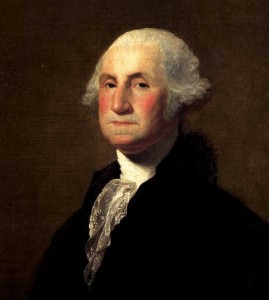 4. George Washington
4. George Washington
No list of presidents would be complete without the very first man to hold the office, and the undisputed father of the United States. However, all of his virtues are greatly blurred between myth and reality. The myths of George Washington assert that he couldn’t tell a lie which is illustrated by the chopping down of a cherry tree and owning up to his mischievous deed during childhood. The reality of Washington still shows what a truly extraordinary man he was. Ultimately, Washington was responsible through his sheer military insight and talent for the colonist’s victory over Britain in the Revolutionary War, and as a result was responsible for the birth of the United States. In some respects he is also responsible for the character of modern American politics. This is because he refused any offers of being a King in favour of a free, democratic system. As president he is also credited as establishing the balance between congressional and presidential power, as well as remaining neutral in all European affairs allowing the new and fragile US government to strengthen and consolidate.
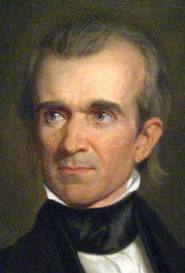 3. James K. Polk
3. James K. Polk
I whole heartedly believe James K. Polk is the most under rated and most poorly celebrated president in the entire history of the USA. Polk’s most notable achievement was victory in the Mexican-American War of 1846-48, the conclusion of this war effectively carved out the modern American land mass and made the United States a truly continental entity.
This achievement is made all the greater when considering the attitudes of Anglo-Saxon settlers in the America, dating back to the 17th century. The Puritan settlers of the New England believed that they were divinely ordained by God to settle the New World, escape the oppression of the Old World and to settle the newly found continent as a New Israel. Additionally, during the early days of the United States the notion of Manifest Destiny was widespread and greatly supported by the American people. Manifest Destiny put forward that Americans were destined by the will of God to overspread and colonise the entire American continent. Polk achieved all these ideas and notions. Aside from his foreign policy success, Polk is also credited for establishing the Smithsonian institute, the issuing of postal stamps and opening the US Naval Academy.
2. Franklin D. Roosevelt
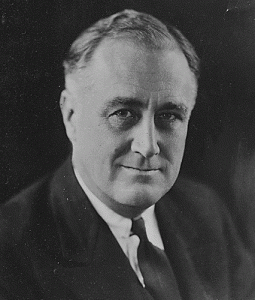
FDR ended the Great Depression, led the US through the Second World War and crafted the modern American Presidency. He achieved all this whilst suffering from polio and the confines of a wheel chair. He is the personification of the American Dream. FDR also holds the distinction of being the only president to be elected for four terms. Prior to World War Two he can be applauded for introducing the New Deal which in essence got America working again and helped end the Great Depression. The Second World War itself also illustrates his skills not only as a war leader and foreign diplomat, but also his tact with domestic policy. His success with foreign policy is simple enough to prove, as America and the allies won the war. However, considering the fact the USA didn’t enter the war until the attack on Pearl Harbour highlights his ability to orchestrate home affairs. Prior to December 1941, the general public wanted the US to remain neutral. Despite FDR’s better judgement he refused to involve the United States. What is remarkable is that not only was he able to join the war at just the right time and lead the US to victory, but this was all achieved from a wheelchair. FDR highlights the mentality, resilience and determination that we should all aspire to have ourselves.
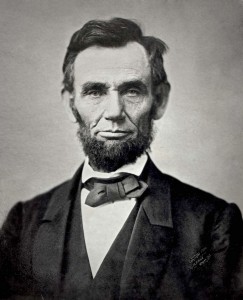 1. Abraham Lincoln
1. Abraham Lincoln
As much as I have tried to think of a less clichéd option to finish this list, I simply cannot justify any other of the forty-four presidents taking primacy over Abraham Lincoln. Even if this were a list of greatest historic figures, Lincoln would time and again come up trumps. In essence, he is the ultimate historic figure. In many respects Lincoln is the complete package. He’s controversial, he’s mythological, he’s a martyr and he is a successful war hero. No other American president produces such emotive and heated response from your average American. African Americans would either call him ‘The Great Emancipator’ or describe him as a racist. If you were to ask conservative Republicans they would applaud him as a self-made man, a nationalist southerner would view him as a war criminal and there is a wealth of patriotic moderates who will hail him as ‘Saviour of the Union’. These are just some of the descriptions and titles Lincoln has been credited with and there truly are too many to list in this brief piece of writing. The conclusion that can be drawn from Lincoln’s presidency is that he led America through the Civil War, the greatest crisis the nation has ever had. The result was a far stronger and unified collection of states where an out dated and immoral system of slavery had finally been abolished.
Enjoy this article? Then why not sign up to Fortitude Magazine’s Weekly Round Up! Our pick of the week’s best news, reviews, videos and music straight to your inbox. Click here to sign up today!


